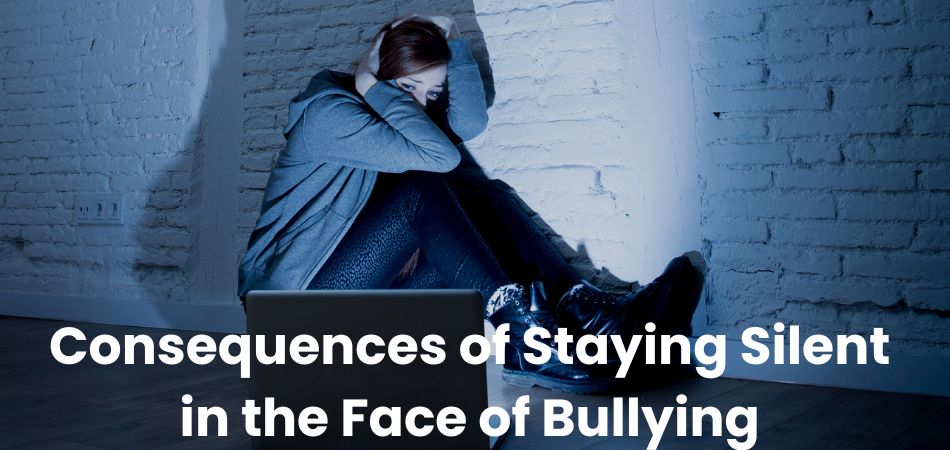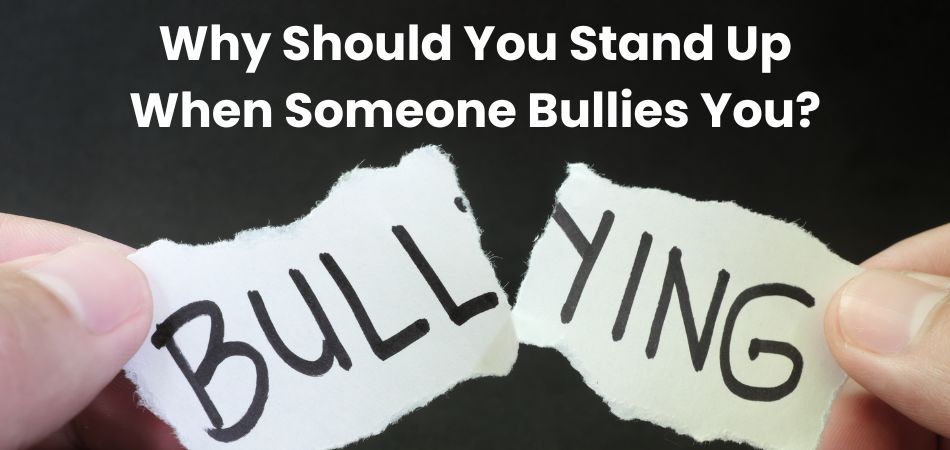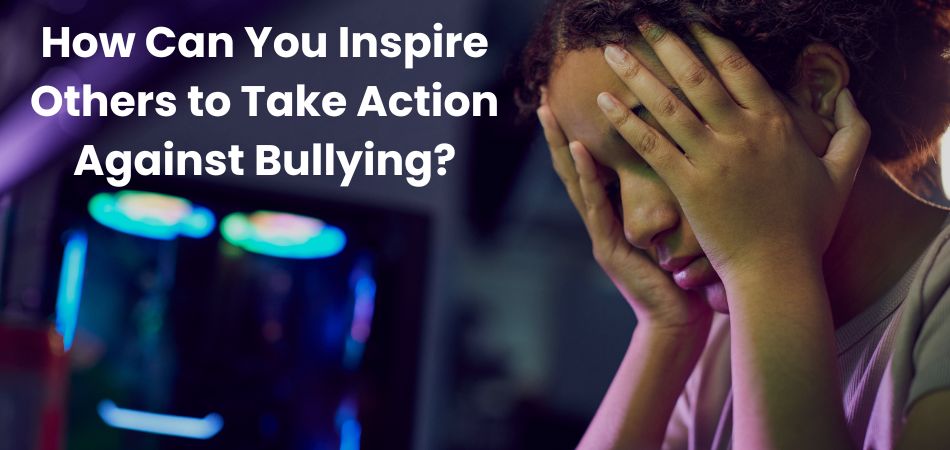There is no doubt that bullying is a pervasive issue that affects individuals of all ages, leaving lasting emotional scars and creating an environment of fear and injustice. Whether it happens in schools, workplaces, or online, staying silent in the face of bullying often allows it to persist. So, why should you stand up when someone bullies you?
Taking action against bullying protects the victim, challenges harmful behavior, and emphasizes respect. It builds your confidence, inspires others, and prevents long-term harm, creating a stronger, united community.
In this post, we’ll explore the reasons why standing up to bullies is essential and how even small acts of courage can make a big difference.
What Does Bullying Mean?
Bullying is a deliberate act of aggression, intimidation, or manipulation aimed at causing harm, fear, or distress to another person. It can take many forms, including physical violence, verbal harassment, emotional abuse, and social exclusion. It is common for bullies to hold perceived power or dominance over their victims, which makes it difficult for the victim to defend themselves.

Modern bullying often occurs in digital spaces, known as cyberbullying, rather than face-to-face interactions. Through social media, messaging apps, and online platforms, bullies can spread rumors, post hurtful comments, or share embarrassing content about others. This virtual form of bullying can be even more harmful, as it can reach a wide audience quickly and leave a permanent digital footprint.
At its core, bullying reflects a lack of empathy and respect for others. Addressing bullying requires awareness, intervention, and creating environments that prioritize kindness and inclusivity to prevent harm and build stronger communities.
Is It Better to Stand Up to Bullies or Ignore Them?
Standing up to bullies is often the better approach because it sends a clear message that their behavior is unacceptable. Ignoring a bully may seem like the easier option, but it can inadvertently embolden them, making the situation worse over time. When you stand up to a bully, you not only defend yourself or the victim but also challenge the behavior directly, potentially discouraging them from targeting others in the future.
It’s not always necessary to confront a bully aggressively when taking a stand. It can involve calmly setting boundaries, seeking help from an authority figure, or offering support to the person being bullied. These actions show strength and resilience, empowering both the victim and the bystanders who may also be affected by the bully’s behavior.
Ignoring bullying may sometimes seem like avoiding conflict, but silence can be mistaken for acceptance. By standing up, you advocate for respect and fairness, creating an environment where bullying is less likely to thrive.
Consequences of Staying Silent in the Face of Bullying
When the victim of bullying remains silent, the bystanders and the community in general may suffer as well. While speaking up may seem daunting, staying silent often allows the bully’s behavior to persist unchecked. Below, we’ll explore the various consequences of inaction and why it’s essential to address bullying.

Emotional and Psychological Damage to Victims
When bullying goes unchallenged, victims often feel isolated, powerless, and unsupported. This can lead to long-term emotional scars, including anxiety, depression, and a loss of self-esteem. Without intervention, the psychological toll may escalate, severely impacting the victim’s quality of life.
Empowerment of the Bully
Silence can be perceived as acceptance, which emboldens bullies to continue their harmful behavior. It reinforces their belief that there are no consequences for their actions. Over time, this unchecked behavior can escalate, potentially leading to more severe forms of aggression.
Negative Impact on Bystanders
Bystanders who witness bullying may feel guilt, fear, or helplessness when they remain silent. This can create a culture of inaction where individuals are hesitant to stand up against wrongdoing. Over time, this environment inspires a lack of accountability and allows bullying to thrive.
Damage to Community or Workplace Culture
In environments where bullying is ignored, trust and respect often erode among members. A toxic atmosphere can develop, affecting productivity, collaboration, and morale. This negativity impacts everyone, not just the bully and the victim.
Perpetuation of Bullying Behavior
When bullies face no resistance, their behavior becomes normalized and more ingrained. This not only harms current victims but also encourages future acts of bullying. Breaking this cycle requires proactive intervention and a collective stand against harmful behaviors.
Why Should You Stand Up When Someone Bullies You?
When it comes to bullying, being courageous can have a significant positive impact on both the victim and the community. It’s not just about confronting the bully but about creating a culture of respect, empathy, and accountability. Here’s why taking a stand is essential and how it benefits everyone involved.

Protect the Victim
When you stand up for someone being bullied, you provide immediate emotional and sometimes physical support. This act of solidarity can help the victim feel less isolated and more empowered. It also interrupts the bullying behavior, giving the victim a chance to regain their confidence. Your actions show them they are not alone, which can make a world of difference.
Set a Positive Example for Others
Standing up against bullying demonstrates courage and integrity, inspiring others to do the same. It encourages bystanders to take action instead of remaining passive. Over time, these small acts of bravery can shift the culture, making bullying less acceptable. You become a role model for standing up for what’s right.
Challenge the Bully’s Behavior
Addressing a bully directly can force them to reconsider their actions and the harm they are causing. Often, bullies rely on the silence of others to continue their behavior. When confronted, they may realize their behavior won’t be tolerated. This confrontation can be a turning point for change, helping them reflect and potentially improve.
Cultivate a Culture of Respect
Taking a stand helps create an environment where kindness and empathy are valued. It sends a message that everyone deserves to be treated with dignity. This cultural shift can prevent future incidents of bullying by encouraging mutual respect. A respectful environment benefits everyone and strengthens the community.
Build Your Own Confidence and Resilience
Standing up to bullying can be empowering, as it challenges you to act with courage. It helps build your self-esteem and teaches you to stand firm in the face of adversity. Over time, these experiences make you more resilient in dealing with challenges. This growth benefits not only you but also those around you.
Prevent Long-Term Harm
Bullying can have long-lasting consequences, such as emotional trauma and diminished self-worth for the victim. By intervening, you may help prevent these long-term effects and promote healing. Taking action early can stop the bullying before it escalates further. This proactive approach is crucial in minimizing harm.
Uphold Ethical and Social Responsibility
When it comes to bullying, standing up means taking action, no matter how difficult it may seem. It reflects a commitment to fairness and justice, ensuring that no one is unfairly targeted. Taking this responsibility seriously can strengthen social bonds and promote unity. Ultimately, it’s an act of integrity that helps build a better community.
Some Effective Ways to Stand Up Against Bullying
Being able to stand up to bullying doesn’t always require grand gestures – simply offering support or speaking up can do the trick. The key is to act in a way that prioritizes safety, empathy, and accountability. Here are some effective ways you can stand up to bullying and make a positive impact.
1. Speak Up Directly
When it’s safe, address the bully with calm but firm language, making it clear their behavior is unacceptable. Saying something like, “That’s not okay,” can disrupt their actions and make them reconsider. Direct intervention shows courage and sets an example for others to follow.
2. Support the Victim
Reach out to the victim and let them know they are not alone. Offer a listening ear, encouragement, or assistance in reporting the incident. Your support can help them feel valued and rebuild their confidence.
3. Involve Authority Figures
If the situation is beyond your control, report it to a trusted adult, teacher, or manager. Authorities can intervene with the appropriate resources to address and resolve the issue. This ensures the situation is handled professionally and prevents further harm.
4. Use Bystander Intervention
Encourage others to stand together against bullying by forming a united front. Bullies are less likely to target individuals when a group collectively disapproves of their behavior. This approach creates a sense of community and discourages further incidents.
5. Utilize Digital Tools Against Cyberbullying
In cases of online bullying or other types of cyberbullying, take screenshots as evidence and report the behavior to the platform or authorities. Offer support to the victim privately and encourage them to block the bully. Addressing different types of cyberbullying and using technology responsibly can help shut down such behavior effectively and swiftly.
How Can You Inspire Others to Take Action Against Bullying?
The best way to inspire others to act against bullying is to set an example for them and create an environment where courage and kindness are valued. When individuals see the impact of speaking up, they’re more likely to join the cause. Here are some practical ways to motivate others to stand against bullying.

- Lead by Example: Show courage by standing up to bullying whenever you witness it. Your actions will inspire others to follow suit and feel confident in doing the same.
- Share Personal Stories: Talk about your experiences or those of others who have successfully addressed bullying. Stories can be powerful motivators, helping people see the positive outcomes of taking a stand.
- Promote Education and Awareness: Organize workshops, discussions, or campaigns to teach others about the effects of bullying. The more people understand the issue, the more likely they are to act.
- Build a Supportive Community: Encourage teamwork and solidarity among peers to address bullying collectively. A united group sends a strong message that bullying is not acceptable.
- Recognize and Reward Positive Actions: Acknowledge and celebrate those who stand up against bullying. Highlighting their efforts encourages others to take similar actions.
Common Questions About Standing Up to Bullying
The act of standing up to bullying is a complex but essential one, and many people are unsure how to do it effectively. Whether you’re unsure about the right steps to take or concerned about the potential consequences, these FAQs aim to provide practical insights. Here are some common questions and their concise answers to guide you.
1. What If Confronting the Bully Makes Things Worse?
Confrontation doesn’t have to mean aggression; it can be done calmly and assertively. If you feel unsafe, seek help from an authority figure or gather support from others before acting. Planning your approach ensures you address the issue without escalating the situation.
2. How Can I Support Someone Who Is Too Scared to Speak Up?
Offer them a listening ear and assure them of your support without judgment. Help them explore safe ways to address the situation, such as involving a trusted adult or reporting the incident. Your encouragement can give them the confidence they need to take the first step.
3. What If I’m Not Sure Whether It’s Really Bullying?
Look for patterns of repeated harm, a power imbalance, and intentional behavior to identify bullying. If in doubt, observe the situation closely or seek advice from a trusted third party. It’s better to address potential harm early than to ignore it altogether.
4. How Can I Stay Calm When Standing Up to a Bully?
Focus on your breathing and rehearse what you want to say beforehand. Remind yourself that you’re acting for a good cause, which can help reduce fear or anxiety. Staying composed shows confidence and makes your message more impactful.
5. What Role Does Social Media Play in Addressing Bullying?
Social media can be a powerful tool for raising awareness and reporting incidents of bullying. Platforms often have features to block users and report harmful content, helping to stop cyberbullying. By sharing positive messages and advocating for kindness, you can also inspire others to take a stand online.
Final Notes
When you stand up to bullying, you are not just defending the victim; you are creating a culture of respect, empathy, and accountability. By taking a stand, you help protect those who are vulnerable, challenge harmful behavior, and inspire others to act with courage and kindness.
So, why should you stand up when someone bullies you? Because your actions can break the cycle of harm, empower the victim, and pave the way for a more inclusive and compassionate environment. Together, we can make a difference by speaking out and ensuring that bullying has no place in our communities.
